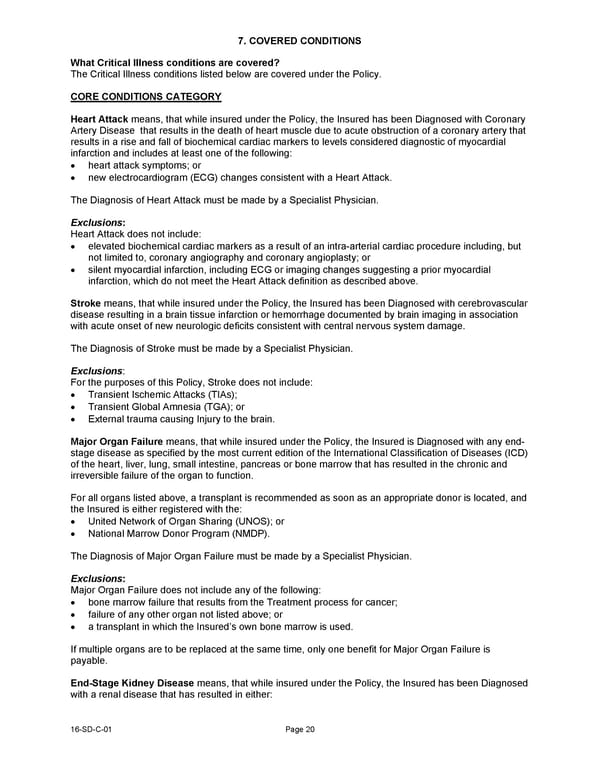7. COVERED CONDITIONS What Critical Illness conditions are covered? The Critical Illness conditions listed below are covered under the Policy. CORE CONDITIONS CATEGORY Heart Attack means, that while insured under the Policy, the Insured has been Diagnosed with Coronary Artery Disease that results in the death of heart muscle due to acute obstruction of a coronary artery that results in a rise and fall of biochemical cardiac markers to levels considered diagnostic of myocardial infarction and includes at least one of the following: · heart attack symptoms; or · new electrocardiogram (ECG) changes consistent with a Heart Attack. The Diagnosis of Heart Attack must be made by a Specialist Physician. Exclusions: Heart Attack does not include: · elevated biochemical cardiac markers as a result of an intra-arterial cardiac procedure including, but not limited to, coronary angiography and coronary angioplasty; or · silent myocardial infarction, including ECG or imaging changes suggesting a prior myocardial infarction, which do not meet the Heart Attack definition as described above. Stroke means, that while insured under the Policy, the Insured has been Diagnosed with cerebrovascular disease resulting in a brain tissue infarction or hemorrhage documented by brain imaging in association with acute onset of new neurologic deficits consistent with central nervous system damage. The Diagnosis of Stroke must be made by a Specialist Physician. Exclusions: For the purposes of this Policy, Stroke does not include: · Transient Ischemic Attacks (TIAs); · Transient Global Amnesia (TGA); or · External trauma causing Injury to the brain. Major Organ Failure means, that while insured under the Policy, the Insured is Diagnosed with any end- stage disease as specified by the most current edition of the International Classification of Diseases (ICD) of the heart, liver, lung, small intestine, pancreas or bone marrow that has resulted in the chronic and irreversible failure of the organ to function. For all organs listed above, a transplant is recommended as soon as an appropriate donor is located, and the Insured is either registered with the: · United Network of Organ Sharing (UNOS); or · National Marrow Donor Program (NMDP). The Diagnosis of Major Organ Failure must be made by a Specialist Physician. Exclusions: Major Organ Failure does not include any of the following: · bone marrow failure that results from the Treatment process for cancer; · failure of any other organ not listed above; or · a transplant in which the Insured’s own bone marrow is used. If multiple organs are to be replaced at the same time, only one benefit for Major Organ Failure is payable. End-Stage Kidney Disease means, that while insured under the Policy, the Insured has been Diagnosed with a renal disease that has resulted in either: 16-SD-C-01 Page20
 Critical Illness cert Page 19 Page 21
Critical Illness cert Page 19 Page 21